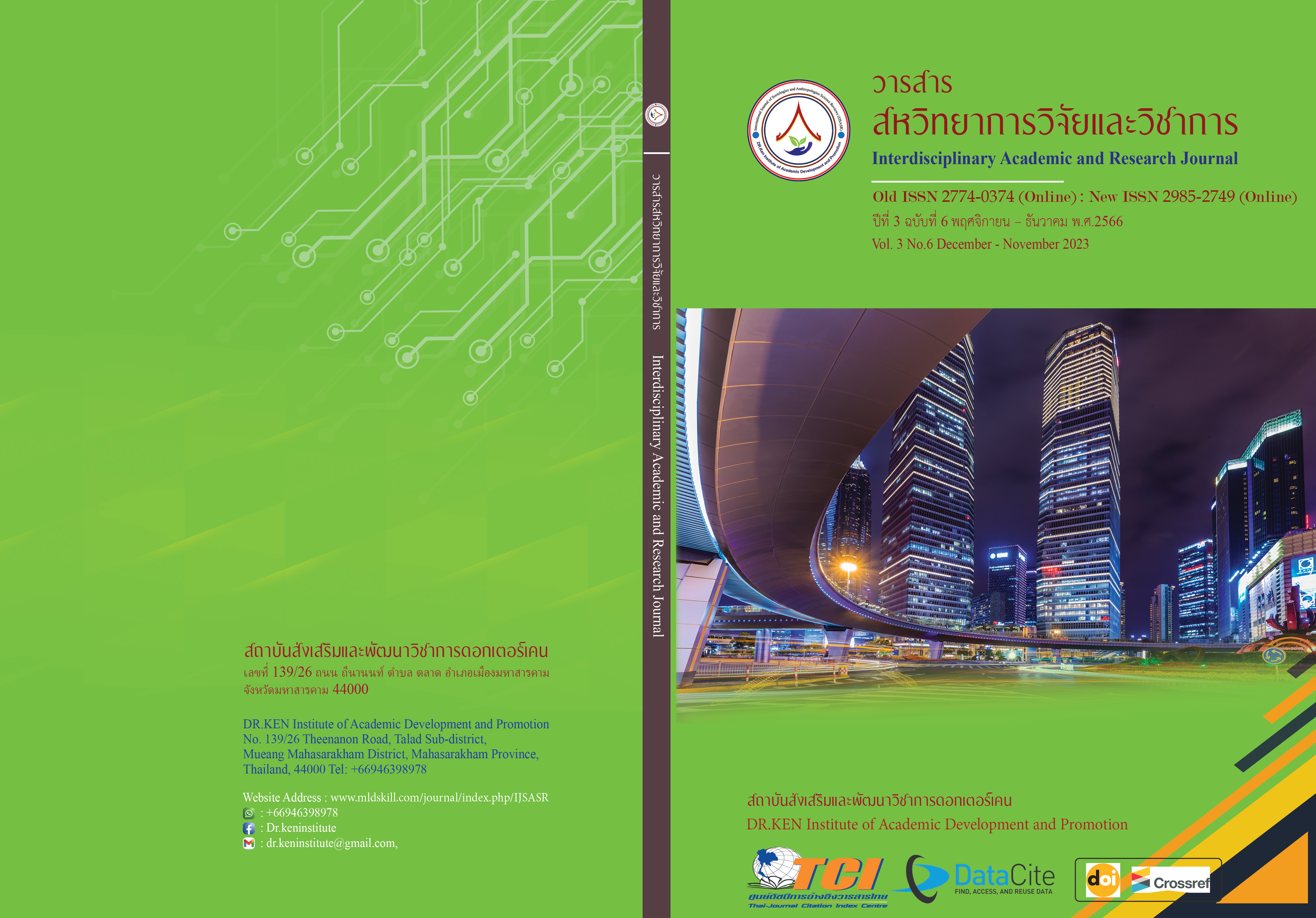Educational Game Activities from Natural Media to Promote Basic Skills Mathematics of Early Childhood
DOI:
https://doi.org/10.60027/iarj.2023.270894Keywords:
Educational Game;, Natural Media;, Basic Math Skills;, Early ChildhoodAbstract
Background and Aims: Mathematics is an important tool related to human daily life. in learning other sciences Gaining experience in mathematics gives learners the ability to think. reasonably and used to solve various problems Well, basic mathematical skills are therefore very important as a basis for further learning. This research intended for 1) To develop educational game activities from natural media 2) to study the effectiveness index of educational game activities from natural media for elementary school children 3) to compare basic mathematical skills of early childhood children before and after organizing educational game activities from natural media.
Methodology: The sample group used in this research were Kindergarten 2 students at Jitranon Kindergarten School. Private Education Promotion Office, Mahasarakham Primary Educational Service Area, Region 1, semester 2, the academic year 2022, 19 students were obtained by cluster random sampling. For kindergarten year 2 students. 2) The basic mathematics skills test for kindergarten year 2 students was a multiple-choice test, with 3 options, and 20 items. Statistics used in data analysis were mean percent, standard deviation, and t-test.
Results: 1) the organization of educational game activities from natural media; to promote basic skills and mathematics of early childhood Efficiency was 80.0/85.0 according to the criteria. 2) The effectiveness index for educational game activities from natural media to promote basic skills in early childhood mathematics equals 0.6777 accounting for 67.77 percent, and 3) basic academic skills in early childhood mathematics After the educational game activities from natural media were higher than before the game activities. Natural media education is Statistically significant at the .05 level.
Conclusion: Engaging in educational game activities using natural media effectively promotes fundamental mathematics skills in young children, meeting the specified criteria with an efficiency rating of 80.0/85.0. The effectiveness index is 67.77%, significantly enhancing basic mathematics skills statistically at the 0.05 level after such activities compared to pre-game educational media exposure.
References
กนกพิษญ์ ศรีสวัสดิ์. (2555). การพัฒนากิจกรรมเกมการศึกษาด้านการเรียงลำดับเพื่อส่งเสริมทักษะทางคณิตศาสตร์ของเด็กปฐมวัย. (วิทยานิพนธ์ปริญญามหาบัณฑิต).มหาสารคาม: มหาวิทยาลัยมหาสารคาม.
กิตติ วงส์พิเชษฐ. (2559). วิทยาเอ็มบริโอของพืชดอก. อุบลราชธานี: คณะเกษตรศาสตร์มหาวิทยาลัยอุบลราชธานี.
กุลยา ต้นติผลาชีวะ. (2551). การจัดกิจกรรมการเรียนรู้สำหรับเด็กปฐมวัย. กรุงเทพ: ผู้แต่ง.
ทิศนา แขมมณี และคณะ. (2536). หลักการและรูปแบบการพัฒนาเด็กปฐมวัยตามวิธีไทย. กรุงเทพฯ: สำนักพิมพ์จุฬาลงกรณ์มหาวิทยาลัย.
ทิศนา แขมมณี. (2555). ศาสตร์การสอน: องค์ความรู้เพื่อการจัดกระบวนการเรียนรู้ที่มีประสิทธิภาพ. กรุงเทพฯ: ด่านสุทธาการพิมพ์.
ปิยะธิดา ปัญญา. (2562). สถิติสำหรับการวิจัย. มหาสารคาม: ตักสิลาการพิมพ์.
เผชิญ กิจระการ และสมนึก ภัททิยธนี. (2545). ดัชนีประสิทธิผล. มหาสารคาม: คณะศึกษาศาสตร์ มหาวิทยาลัยมหาสารคาม.
พิไลลักษณ์ แก้วเก่า. (2557). การพัฒนาความพร้อมทางคณิตศาสตร์โดยใช้เกมการศึกษา. วิทยานิพนธ์ปริญญาหาบัณฑิต. นครพนม: มหาวิทยาลัยนครพนม.
เพ็ญจันทร์ เงียบประเสริฐ. (2542). คณิตศาสตร์สำหรับเด็กปฐมวัย. ภูเก็ต: คณะครุศาสตร์ สถาบันราชภัฏภูเก็ต.
ไพศาล วรคำ. (2559). การวิจัยทางการศึกษา. มหาสารคาม: ตักศิลาการพิมพ์.
ไพศาล วรคำ. (2561). การวิจัยทางการศึกษา. พิมพ์ครั้งที่ 9. มหาสารคาม: ตักสิลาการพิมพ์.
รุ่งอรุณ ลียะวณิชย. ์(2555). คู่มือคณิตศาสตร์ การสอนคณิตศาสตร์ ด้วยเกม. สำนักพิมพ์แห่งจุฬาลงกรณมหาวิทยาลัย: กรุงเทพมหานคร.
วรดนู จีระเดชากุล. (2551). นันทนาการสำหรับเด็ก. (พิมพ์ครั้งที่ 5). กรุงเทพฯ: จุฬาลงกรณมหาวิทยาลัย.
วรนาท รักสกุลไทย. (2554). สุดยอดเทคนิคการจัดการเรียนรู้แบบครูมืออาชีพ. กรุงเทพฯ: แฮปปี้ เลิร์นนิ่ง.
วรรณีย์ พรมนนท์ (2555). การพัฒนารูปแบบการสอนทีเน้นการบูรณาการด้วยเกมการศึกษาจากสื่อธรรมชาติเพื่อพัฒนาทักษะพื้นฐานทางคณิตศาสตร์ สำหรับนักเรียนชั้นอนุบาลปีที่ 2. วิทยานิพนธ์ปริญญามหาบัณฑิต. กรุงเทพฯ: มหาวิทยาลัยราชภัฏบ้านสมเด็จเจ้าพระยา.
สถาบันส่งเสริมการสอนวิทยาศาสตร์และเทคโนโลยี. (2551). การวัดผลประเมินผลคณิตศาสตร์.กรุงเทพฯ: สถาบันส่งเสริมการสอนวิทยาศาสตร์และเทคโนโลยี
สถาบันส่งเสริมการสอนวิทยาศาสตร์และเทคโนโลยี. (2551). คู่มือกรอบมาตรฐานการเรียนรู้คณิตศาสตร์ปฐมวัย. กรุงเทพฯ: สถาบันส่งเสริมการสอนวิทยาศาสตร์และเทคโนโลยี
สำนักวิชาการและมาตรฐานการศึกษา. (2560). คู่มือหลักสูตรการศึกษาปฐมวัย พุทธศักราช 2560. พิมพ์ครั้งที่ 1. กรุงเทพฯ: ชุมชนสหกรณ์การเกษตรแห่งประเทศไทย.
สิริกานต์ ก้อนวิมล. (2558). การพัฒนาความพร้อมด้านคณิตศาสตร์โดยเกมการศึกษา. วิทยานิพนธ์ปริญญามหาบัณฑิต. มหาสารคาม: มหาวิทยาลัยราชภัฎมหาสารคาม.
สิริมณี บรรจง. (2554). เอกสารประกอบการสอน: คณิตศาสตร์สำหรับเด็กปฐมวัย. กรุงเทพฯ: มหาวิทยาลัยราชภัฏสวนสุนันทา.
สุณี บุญพิทักษ์. (2557). วิจัยชั้นเรียนปฐมวัย: หลักการปฏิบัติจากประสบการณ์. กรุงเทพฯ: ปัญญาชน.
อัญชลี ไสยวรรณ. (2553). เอกสารประกอบการบรรยาย "คณิตศาสตร์สำหรับเด็กปฐมวัย" กรุงเทพฯ: มหาวิทยาลัยราชภัฏพระนคร.
Barbosa, H. J. (2004). Numerical Abilities in Preschool Children with a Typical Development: A Development Description. Ed.D.: Boston University.
Brewer, J.A. (1995). Introduction to Early Childhood Education: Preschool through Primary Grades. Boston: Allyn Bacon.
Kline, K. (2000). Early Childhood teachers Discuss the Standard. Teaching Children Mathematics, 6(9), 568-571.
Mayesky, Mary. (1998). Creative Activities for Young Children. United States of America, New York: Delmar Publishers.
Smith, C. (2010). Mathematics in Early Childhood: An Investigation of Mathematics Skills in Preschool and Kindergarten Students. English: Alfred University.
Downloads
Published
How to Cite
Issue
Section
License
Copyright (c) 2023 Suchira Boontrai, Tassanee Nakunsong

This work is licensed under a Creative Commons Attribution-NonCommercial-NoDerivatives 4.0 International License.
Copyright on any article in the Interdisciplinary Academic and Research Journal is retained by the author(s) under the under the Creative Commons Attribution-NonCommercial-NoDerivatives 4.0 International License. Permission to use text, content, images, etc. of publication. Any user to read, download, copy, distribute, print, search, or link to the full texts of articles, crawl them for indexing, pass them as data to software, or use them for any other lawful purpose. But do not use it for commercial use or with the intent to benefit any business.
















.png)


